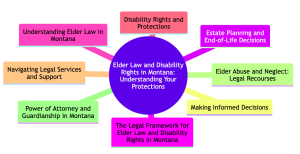The mingled details of elder law and disability rights in Montana form a crucial safety net, protecting the most vulnerable among us. As individuals age or face disabilities, the legal landscape can seem daunting. Yet, Montana’s laws provide robust safeguards that uphold dignity, autonomy, and rights. This article dives into the essential protections and resources available, highlighting the intersection of elder law and disability rights in the Treasure State.
Key Takeaways
- Elder law plays a pivotal role in defending the elderly’s rights and well-being.
- Disability rights and elder law in Montana converge to offer comprehensive protections.
- Elderly individuals with disabilities have access to specific legal protections and services.
- Understanding one’s rights under Montana law is crucial for effective advocacy.
- A variety of resources and legal assistance are available to navigate these complex areas.

The Legal Framework for Elder Law and Disability Rights in Montana
Montana’s legal landscape for elder law and disability rights intertwines state statutes such as the Montana Elder and Persons with Developmental Disabilities Abuse Prevention Act, the Uniform Health Care Decisions Act, and the Montana Guardianship and Conservatorship Act with federal regulations to safeguard aging individuals and those with disabilities.
These state laws are crafted to meet the specific needs and rights of Montana’s elderly and disabled populations, offering comprehensive support and protection across healthcare decision-making, financial management, and abuse prevention.
On the federal front, legislation such as the Americans with Disabilities Act (ADA) and the Older Americans Act plays a significant role in shaping the rights and services available to Montana’s elderly and disabled populations. The ADA, for example, guarantees equal opportunity for individuals with disabilities in public accommodations, employment, transportation, state and local government services, and telecommunications. The Older Americans Act provides for a range of services to older Americans, including meals, caregiver support, and health promotion programs.
Together, these state and federal laws create a comprehensive legal foundation that supports the dignity, autonomy, and rights of Montana’s elderly and disabled residents.
Understanding Elder Law in Montana
Elder law in Montana encompasses a wide range of legal matters affecting the aging population. This specialized area of law focuses on the needs of older adults, particularly those who are disabled or require long-term care. Elder law attorneys in Montana are equipped to handle a variety of issues, from estate planning and healthcare to guardianship and elder abuse.
- Estate Planning: Creating wills, trusts, and estate plans to manage and protect assets.
- Guardianship: Establishing legal guardians for individuals unable to make decisions for themselves.
- Medicare/Medicaid: Navigating the complexities of Medicare and Medicaid benefits.
- Long-Term Care Planning: Planning for long-term care needs and options.
- Elder Abuse Protection: Legal interventions to protect against physical, emotional, and financial abuse.
Disability Rights and Protections
ADA and Its Application in Montana
The Americans with Disabilities Act (ADA) ensures that individuals with disabilities have the same rights and opportunities as everyone else. In Montana, the ADA’s application extends to employment, state and local government services, public accommodations, commercial facilities, and transportation, ensuring accessibility and prohibiting discrimination.
State-Specific Disability Laws and Regulations
Montana has enacted laws that complement the ADA, offering additional protections for individuals with disabilities. These laws address accessibility in public buildings, fair housing, and employment rights, ensuring that Montana’s disabled population receives full legal protection.
Rights of Disabled Elderly in Healthcare and Living Arrangements
Elderly individuals with disabilities in Montana have specific rights regarding healthcare and living arrangements. These rights include access to adequate medical care, the right to live in accessible housing, and the freedom to choose from a variety of living arrangements that best suit their needs and preferences.
Navigating Legal Services and Support
Accessing legal services and support is crucial for elderly individuals with disabilities in Montana. Various organizations and resources are available to provide assistance, from legal advice to advocacy services.
Key Organizations and Resources in Montana
| Organization | Services Offered |
| Disability Rights Montana (1) | Advocacy and legal representation for disabled individuals |
| Montana Legal Services Association | Free legal aid for low-income Montanans |
| Area Agencies on Aging | Local resources and support for aging individuals |
| Montana Department of Public Health and Human Services | State programs and services for the elderly and disabled |
Finding the Right Legal Assistance
Securing the right legal assistance is vital for navigating elder law and disability rights. Here are steps to find suitable representation:
- Identify Your Needs: Determine the specific legal services you require.
- Research Attorneys: Look for attorneys specializing in elder law and disability rights in Montana.
- Check Credentials: Verify the attorney’s credentials and experience in relevant areas.
- Consult Multiple Attorneys: Meet with several attorneys to find the best fit for your needs.
Power of Attorney and Guardianship in Montana
Power of attorney and guardianship are critical tools for managing the affairs of elderly individuals with disabilities. Understanding these legal concepts is essential for ensuring their rights and well-being are protected.
Comparison of Power of Attorney and Guardianship
| Aspect | Power of Attorney | Guardianship |
| Control | Grants specific powers to an agent | Court-appointed guardian makes decisions |
| Scope | Can be financial, healthcare, or both | Broad, covering all aspects of care |
| Flexibility | Can be tailored to specific needs | Generally more rigid and comprehensive |
These legal tools offer different levels of control and protection, making it crucial to choose the most appropriate option for each individual’s situation.
Making Informed Decisions
Making informed legal decisions about power of attorney and guardianship is paramount for elderly individuals, especially those with disabilities. These decisions directly impact your autonomy and protection, ensuring that your wishes are respected even when you might not be in a position to articulate them yourself. Power of attorney allows you to designate someone you trust to manage your affairs, be it financial, healthcare, or both. Guardianship, while more comprehensive, provides a safety net for those who may no longer be able to make decisions for themselves. Both require thoughtful consideration and understanding of their implications to ensure that your rights and desires are upheld.
Choosing the right person to hold these responsibilities is as crucial as the legal instruments themselves. It’s about trust, understanding, and respect for your wishes. Engaging in open discussions with potential agents or guardians about your values, medical preferences, and financial management can guide you in making decisions that best reflect your interests. Remember, these decisions are about maintaining your voice in matters concerning your life and well-being.
Elder Abuse and Neglect: Legal Recourses
Recognizing Signs of Abuse and Neglect
Elder abuse and neglect can manifest in many forms, including physical, emotional, financial, and sexual abuse, as well as neglect and abandonment. Recognizing the signs is the first step in protecting yourself or a loved one. These signs might include unexplained injuries, sudden financial difficulties, changes in mood or behavior, and poor hygiene or living conditions.
Legal Protections Against Elder Abuse in Montana
Montana law provides strong protections for the elderly against abuse and neglect. This includes legal recourse through restraining orders, adult protective services, and legal action against perpetrators. The state takes these matters seriously, with laws designed to safeguard the dignity and well-being of its elderly residents.
Steps to Take if Abuse or Neglect is Suspected
- Report the abuse to local authorities or adult protective services immediately.
- Document any evidence of abuse or neglect.
- Consult with an elder law attorney to explore legal options.
- Engage with local support groups and resources for guidance and assistance.
- Consider emergency guardianship if the individual is in immediate danger.
Estate Planning and End-of-Life Decisions
Estate planning and making end-of-life decisions are critical aspects of elder law that ensure your wishes are honored and your legacy is protected. This process involves drafting documents like wills, trusts, advance healthcare directives, and powers of attorney.
- Wills and Trusts: Specify how your assets should be distributed.
- Advance Healthcare Directives: Outline your wishes for medical treatment.
- Powers of Attorney: Designate someone to make decisions on your behalf.
- Living Wills: State your wishes regarding life-sustaining treatment.
Taking control of these decisions early on provides peace of mind and ensures that your preferences are known and respected.
Final Thoughts
Understanding elder law and disability rights in Montana empowers you to make informed decisions about your future, protect your rights, and access the support you need. Whether it’s choosing the right legal tools like power of attorney and guardianship, safeguarding against abuse, or planning your estate, knowledge is your best defense.
Montana Elder Law stands ready to guide you through these complex areas with expertise and compassion. Their dedication to upholding the rights and dignity of Montana’s elderly and disabled population makes them invaluable allies in navigating the legal landscape. For personalized advice and support, reach out to Montana Elder Law, where your rights and well-being are the top priority.
Visit our Homepage for more resources.
Reference:
(1) Disability Rights Montana, 2021 Position Statements, https://disabilityrightsmt.org/




